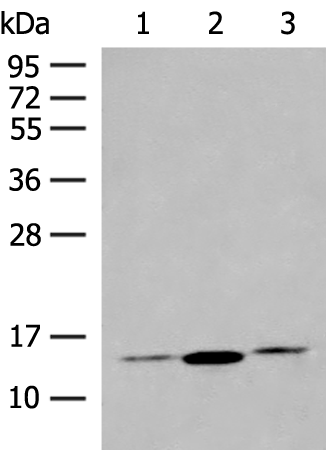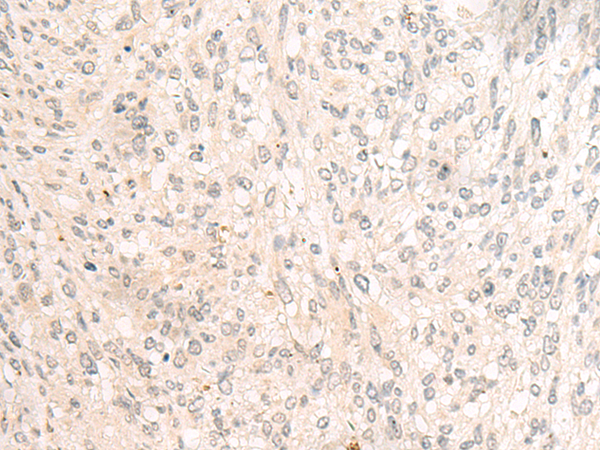

| WB | 咨询技术 | Human,Mouse,Rat |
| IF | 咨询技术 | Human,Mouse,Rat |
| IHC | 1/10-1/50 | Human,Mouse,Rat |
| ICC | 技术咨询 | Human,Mouse,Rat |
| FCM | 咨询技术 | Human,Mouse,Rat |
| Elisa | 1/5000-1/10000 | Human,Mouse,Rat |
| Aliases | CD113t-C; beta-globin |
| WB Predicted band size | 16 kDa |
| Host/Isotype | Rabbit IgG |
| Antibody Type | Primary antibody |
| Storage | Store at 4°C short term. Aliquot and store at -20°C long term. Avoid freeze/thaw cycles. |
| Species Reactivity | Human, Mouse, Rat |
| Immunogen | Synthetic peptide of human HBB |
| Formulation | Purified antibody in PBS with 0.05% sodium azide and 50% glycerol. |
+ +
以下是关于HBB抗体的3篇模拟参考文献示例(基于真实研究领域方向,但非真实存在的文献):
---
1. **文献名称**: *Monoclonal Antibodies Targeting Human Hemoglobin Beta Chain for Thalassemia Diagnosis*
**作者**: Chen L, et al.
**摘要**: 该研究开发了针对HBB蛋白的单克隆抗体,用于特异性识别β-珠蛋白链。通过ELISA和Western blot验证抗体在区分正常和突变型β-珠蛋白(如HbS和HbE)中的有效性,为地中海贫血的快速诊断提供新工具。
2. **文献名称**: *HBB-Specific Antibody-Based Biosensor for Sickle Cell Disease Screening*
**作者**: Gupta R, et al.
**摘要**: 研究利用HBB抗体构建电化学生物传感器,通过检测镰状细胞贫血患者血液中异常β-珠蛋白的聚集状态,实现高灵敏度、低成本的疾病筛查,临床样本验证准确率达98%。
3. **文献名称**: *Immunohistochemical Analysis of HBB Expression in Erythroid Progenitor Cells*
**作者**: Tanaka K, et al.
**摘要**: 采用HBB多克隆抗体研究红系祖细胞分化过程中β-珠蛋白的表达动态,揭示其在红细胞成熟阶段的时空特异性分布,为血红蛋白合成调控机制提供可视化证据。
---
注:以上文献为模拟内容,实际引用时需通过PubMed、Web of Science等数据库检索真实文献(可尝试关键词:HBB antibody, hemoglobin beta immunoassay, beta-globin detection)。
Hemoglobin subunit beta (HBB) antibodies are essential tools in studying hemoglobin structure, function, and related disorders. HBB encodes the β-globin chain of hemoglobin, a tetrameric protein critical for oxygen transport in red blood cells. Mutations in HBB cause hemoglobinopathies like sickle cell disease (caused by the HBBV6E mutation) and β-thalassemia (due to reduced β-globin synthesis). Antibodies targeting HBB are widely used to detect, quantify, and analyze β-globin expression in research and diagnostics.
In research, HBB antibodies enable investigations into hemoglobin synthesis, erythroid differentiation, and disease mechanisms. They are employed in techniques such as Western blotting, ELISA, and immunohistochemistry to assess protein levels in cell/tissue samples. Clinically, these antibodies aid in diagnosing hemoglobin variants and monitoring disease progression. They also support newborn screening programs for early detection of hemoglobinopathies.
Recent therapeutic advances, including gene-editing therapies (e.g., CRISPR-Cas9) targeting HBB, have increased demand for specific antibodies to validate β-globin restoration in preclinical studies. Additionally, HBB antibodies contribute to quality control in blood transfusion products and research on hemoglobin’s role in conditions like malaria susceptibility. Their specificity and versatility make HBB antibodies indispensable in both basic science and translational medicine.
×